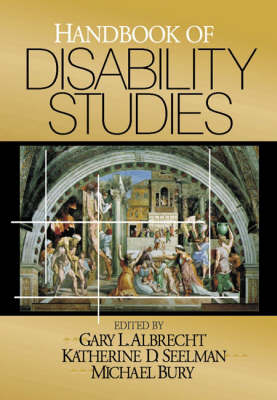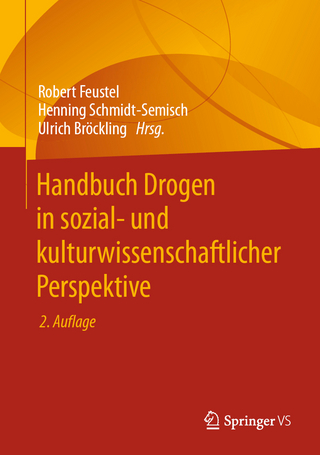
Handbook of Disability Studies
SAGE Publications Inc (Verlag)
978-0-7619-1652-9 (ISBN)
This path-breaking international handbook of disability studies signals the emergence of a vital new area of scholarship, social policy and activism. Drawing on the insights of disability scholars around the world and the creative advice of an international editorial board, the book engages the reader in the critical issues and debates framing disability studies and places them in an historical and cultural context. Five years in the making, this one volume summarizes the ongoing discourse ranging across continents and traditional academic disciplines. To provide insight and perspective, the volume is divided into three sections: The shaping of disability studies as a field; experiencing disability; and, disability in context. Each section, written by world class figures, consists of original chapters designed to map the field and explore the key conceptual, theoretical, methodological, practice and policy issues that constitute the field. Each chapter provides a critical review of an area, positions and literature and an agenda for future research and practice. The handbook answers the need expressed by the disability community for a thought provoking, interdisciplinary, international examination of the vibrant field of disability studies. The book will be of interest to disabled people, scholars, policy makers and activists alike. The book aims to define the existing field, stimulate future debate, encourage respectful discourse between different interest groups and move the field a step forward.
Gary L. Albrecht is a Fellow of the Royal Belgian Academy of Arts and Sciences, Extraordinary Guest Professor of Social Sciences, University of Leuven, Belgium and Professor Emeritus of Public Health and of Disability and Human Development at the University of Illinois at Chicago. After receiving his Ph.D. from Emory University, he has served on the faculties of Emory University in Sociology and Psychiatry, Northwestern University in Sociology, Rehabilitation Medicine and the Kellogg School of Management and the University of Illinois at Chicago (UIC) in the School of Public Health and in the Department of Disability and Human Development. Since retiring from the UIC in 2005, he divides his time between Europe and the United States. He works in Boulder, Colorado and Brussels, Belgium. He was recently a Scholar in Residence at the Maison des Sciences de l’Homme (MSH) in Paris, a visiting Fellow at Nuffield College, the University of Oxford and a Fellow in Residence at the Royal Flemish Academy of Science and Arts, Brussels Katherine D. Seelman, Ph.D. is associate dean and professor of rehabilitation science and technology at the School of Health and Rehabilitation Sciences at the University of Pittsburgh, USA. She holds a secondary appointment in the School of Public Health and is co-scientific director of the National Science Foundation- supported Quality of Life Technology Engineering Research Center. During the Clinton Administration, she served as Director of the National Institute on Disability and Rehabilitation Research (NIDRR). Her research and education interests include science and technology R&D trends that enhance independence for people with disabilities and older adults; end-user and stakeholder participation; Disability Studies; Science, Technology and Public Policy and International Rehabilitation. In 2006, Dr. Seelman was invited to serve on the World Health Organization 9-member international editorial committee to guide the development of the first world report on disability. She has lectured and keynoted in countries throughout the world including Japan′s National Rehabilitation Center for Persons with Disabilities and World Health Organization′s Center in 2003 and in Vietnam for the World Bank in 2002. On the U.S. local and state levels, Pennsylvania Governor Ed Rendell appointed her to two disability State Advisory Committees. She serves on the Pennsylvania Senate Technology Healthcare Working Group. The Mayor and the County Executive appointed her to the City of Pittsburgh/Allegheny County Task Force on Disability which she co-chairs. She was named "A Person Who Made a Difference" in 2002 by Pittsburgh′s leading newspaper, the Pittsburgh Post-Gazette.
Introduction: The Formation of Disability Studies - Gary L Albrecht, Katherine D Seelman, and Michael Bury
PART ONE: THE SHAPING OF DISABILITIES STUDIES AS A FIELD
An Institutional History of Disability - David L Braddock and Susan Parish
Counting Disability - Glenn T Fujiura and Violet Rutkowski-Kmitta
Disability Definitions, Models, Classification Schemes and Applications - Barbara Altman
Theorizing Disability - Gareth Williams
Methodological Paradigms That Shape Disability Research - Scott Campbell Brown
Disability - Patrick Fougeyrollas and Line Beauregard
An Interactive Person-Environment Social Creation
Representation and Its Discontents - David T Mitchell and Sharon L Snyder
The Uneasy Home of Disability in Literature and Film
Philosophical Issues in the Definition and Social Response to Disability - David Wasserman
Disability and the Sociology of the Body - Bryan S Turner
Intellectual Disabilities- Quo Vadis? - Trevor R Parmenter
Disability, Bioethics and Human Rights - Adrienne Asch
Disability Studies and Electronic Networking - Ellen Liberti Blasiotti, John D Westbrook, and Iwao Kobayashi
PART TWO: EXPERIENCING DISABILITY
Divided Understandings - Carol Gill
The Social Experience of Disability
Mapping the Family - Philip M Ferguson
Disability Studies and the Exploration of Parental Response to Disability
Disability and Community - Michael P Kelly
A Sociological Approach
Welfare States and Disabled People - Robert F Drake
Advocacy and Political Action - Sharon Barnartt, Kay Schrinerm and Richard Scotch
Health Care Professionals and Their Attitudes Towards, and Decisions Affecting Disabled People - Ian Basnett
The Role of Social Networks in the Lives of Persons with Disabilities - Bernice A Pescosolido
Inclusion/Exclusion - Jean-François Ravaud and Henri-Jacques Stiker
An Analysis of Historical and Cultural Meanings
PART THREE: DISABILITY IN CONTEXT
Disability Culture - Colin Barnes and Geoff Mercer
Assimilation or Inclusion?
Identity Politics, Disability and Culture - Lennard J Davis
Making the Difference - Tom Shakespeare and Nick Watson
Disability, Politics, and Recognition
Disability Human Rights, Law and Policy - Jerome E Bickenbach
The Political Economy of the Disability Marketplace - Gary L Albrecht and Michael Bury
Disability and Health Policy - Gerben DeJong and Ian Basnett
The Role of Markets in the Delivery of Health Services
Disability Benefit Programs - Bonnie O′Day and Monroe Berkowitz
Can We Improve the Return to Work Record?
A Disability Studies Perspective on Employment Issues and Policies for Disabled People - Kay Schriner
An International View
Science and Technology Policy - Katherine D Seelman
Is Disability a Missing Factor?
Disability, Education and Inclusion - Len Barton and Felicity Armstrong
Cross-Cultural Issues and Dilemmas
Support Systems - Simi Litvak and Alexandra Enders
The Interface Between Individuals and Environments
The Relationship between Disabled People and Health and Welfare Professionals - Sally French and John Swain
Public Health Trends in Disability - Don Lollar
Past, Present, and Future
Disability in the Developing World - Benedicte Ingstad
| Erscheint lt. Verlag | 30.7.2001 |
|---|---|
| Verlagsort | Thousand Oaks |
| Sprache | englisch |
| Maße | 215 x 279 mm |
| Gewicht | 2210 g |
| Themenwelt | Sozialwissenschaften ► Soziologie |
| ISBN-10 | 0-7619-1652-0 / 0761916520 |
| ISBN-13 | 978-0-7619-1652-9 / 9780761916529 |
| Zustand | Neuware |
| Haben Sie eine Frage zum Produkt? |
aus dem Bereich


